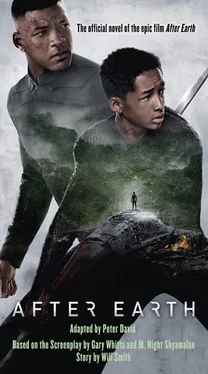The doctor’s expression changes again. Her mouth returns to its original shape, and her eyebrows come together in a knot of flesh above the bridge of her nose.
“It’s all right, Jon. We’ll talk about it later. For now, just get some rest.”
Jon starts to protest, but Doctor Gold holds up a hand, her fingers long and slender.
“No talking,” she insists. “Rest.”
Then she does something at the side of Jon’s bed, and suddenly Jon’s very sleepy. He watches the doctor’s face shiver like a reflection in a wind-struck pool. Then he feels himself dropping into a deep, echoing darkness.
The next time Jon wakes up, he knows where he is and has a better idea of why he’s there. Doctor Gold isn’t present at the moment. But there’s a nurse in the room, a big dark-haired man, walking over to take a look at him.
“It’s all right,” Jon says. “I’m fine.”
“Terrific,” says the nurse, though he looks concerned. “I’ll get your doctor.”
“Go ahead,” Jon says.
The nurse goes as far as the entrance to the room, stands half inside and half out, and calls to someone down the hall. A moment later, he comes back inside.
“It’ll be just a minute,” he says.
“All right,” says Jon.
Funny. He doesn’t feel the vagueness anymore, but he still feels different. Lighter somehow, as if a burden had been lifted from him.
Suddenly the nurse is back in the room. “Sorry. Turns out it’ll be more than a minute. Do you mind waiting?”
Jon finds that he doesn’t mind at all.
He leans back into the pillow and wonders how long it will be. Not that he cares. He just wonders.
Despite what the nurse has said, it doesn’t take long for Doctor Gold to show up. She has long blond hair. She tucks some of it behind her ear as she sits down on the edge of his bed.
“Feeling better?” she asks.
This time he knows how to answer. “The cotton’s gone.”
“That’s good. Do you remember anything more about your procedure?”
“I remember that you operated on my amygdalae.”
“Not me, actually. That was Doctor Nizamani. But yes… your amygdalae…”
“The amygdalae control fear.” He recalls having heard someone say so.
“That’s true.”
“You wanted me to be unafraid.” He recalls that, too.
“ You wanted it as well, Jon. That’s why you volunteered for the procedure.”
“I… volunteered?”
Doctor Gold tilts her head to one side. “Do you remember the Ursa, Jon?”
He sees the flash of something big and pale again. As pale as a fish’s belly . “Yes. They kill people. They’re predators.”
“They are. And we’ve been dealing with them for hundreds of years on and off. We get rid of them, and then a new wave appears, each one more difficult to exterminate than the last. Does this sound familiar?”
“Yes.”
“Excellent. You also recall that the Ursa in this wave are better hunters than the ones we’ve dealt with in the past. That’s because they have an ability they never had before. They sense our fear .
“Lately we’ve discovered that there are people who can elude the Ursa—people who don’t experience fear under certain circumstances. We call them Ghosts. Unfortunately, there are only a handful of them, and they can’t be everywhere—which is why there were hundreds of lethal Ursa attacks in the last year alone.”
Was that a lot? Jon didn’t know.
“Then we asked ourselves, ‘Why not explore the possibility of creating Ghosts?’ In other words, taking away the ability to experience fear. We experimented with a number of ways to do this, but none of them completely eradicated the fear response. That left us with just one approach: the one we pursued in your case.”
“A procedure.”
“Yes.”
“On my amygdalae.”
“It was Doctor Nizamani’s idea. He knew that the amygdalae process sensory information and react by instilling in the brain what we know as fear. And he’ll tell you that they do so for good reason. Without fear, our ancestors would never have been spurred to flee from saber-tooth tigers and other predators.
“So what we were talking about was going against nature. That’s something we don’t do around here when we can help it. But the Ursa are taking a terrible toll, Jon. We have to try any approach that has a reasonable chance of success. And we thought if we took away your fear—”
“I could be a Ghost.”
“Yes. And if it worked in your case, it might work in others.”
Jon thinks about that. “ Did it work?”
“What do you think?”
He examines his mental state. “I don’t feel any fear. However, I don’t think there’s anything in this room I’d be scared of. Is there?”
“Nothing,” the doctor agrees.
“Then am I undetectable to the Ursa?”
She shrugs. “There’s really only one way to find out. But first you’ve got to recuperate from your surgery.” She starts to leave—to go on to her next patient, Jon imagines.
“Will you continue to visit?” he asks.
Doctor Gold stops long enough to say, “As long as you need me.”
Soon Jon receives a visit from another doctor: the one who performed his surgery. Doctor Nizamani is a small man with a big head and a dark beard flecked with gray. One small spot on the left side of his chin. Doctor Nizamani’s mouth, like Doctor Gold’s, pulls up at the corners. And like Doctor Gold, he asks Jon what he remembers. When Jon responds, Doctor Nizamani makes notes on a personal access tablet.
“Are you experiencing headaches? Other discomfort?”
“No,” Jon says.
“Good.” Doctor Nizamani studies the computer data on the hologram beside Jon’s bed, calling up one screen after the other. Finally, he says, “I want you to walk up and down the hall, get some exercise. Your nurse, Marcus, will accompany you. How’s that sound?”
“Sound?” Jon says. He’s not sure what the doctor is asking. “You mean…?”
Doctor Nizamani pats Jon on the shoulder. “Never mind. Just walk.”
Then the doctor leaves. The nurse with the dark hair approaches Jon.
“Ready to take a walk?” he asks.
Jon says he’s ready. With the nurse’s help, he gets out of bed. His legs are weak, and they shake a little.
But he walks.
Jon and Marcus negotiate the length of the hall four times. Then Marcus helps Jon back into his bed.
“Nice job,” Marcus says, extending his hand.
Jon looks at it, wondering what Marcus expects of him. After a while, Marcus takes his hand back. “That’s okay,” he says.
Jon has no idea what Marcus is talking about.
The next morning, Jon and Marcus walk again. Afterward, the nurse tells Jon he can take his meal in the cafeteria instead of in bed.
The cafeteria contains eight rectangular metal tables. It’s empty except for a couple of other patients sitting at the table nearest the window.
One of them is a tall fair-haired man who is missing an arm. The other is a woman with dark skin and a long black braid. The right side of her face, including one of her eyes, is covered with a bandage.
They’re eating food from blue ceramic trays. Jon sees perhaps fifty such trays stacked by a wall alongside a buffet counter offering perhaps twenty choices of casserole, sandwich, salad, and soup.
Marcus says he’ll be right back. “Enjoy yourself.”
Jon considers the nurse’s choice of words. Enjoy? He scans the buffet. Nothing appeals to him. But he knows he has to eat.
“Hey,” says the fair-haired man, his voice echoing a little as he addresses Jon across the room, “I felt the same way the first time. At least it’s hot.”
Читать дальше












